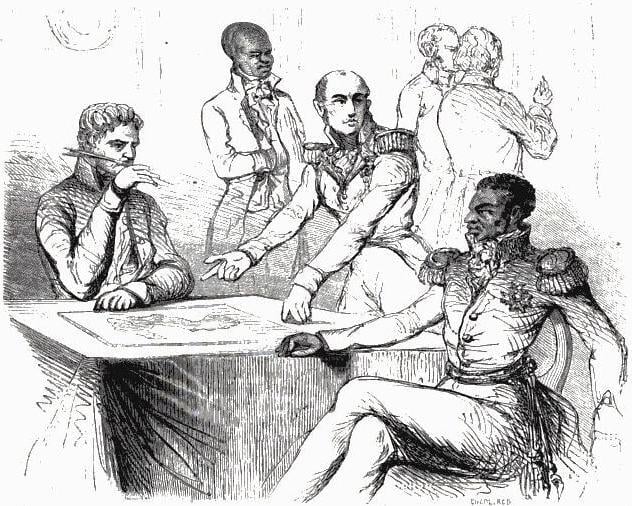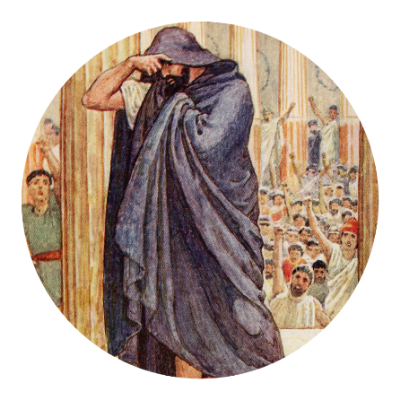The Haitian independence debt involves an 1825 agreement between Haiti and France that included France demanding an indemnity of 150 million francs in five annual payments of 30 million to be paid by Haiti in claims over property – including Haitian slaves – that was lost through the Haitian Revolution in return for diplomatic recognition. Haiti was forced to take a loan for the first 30 million,[a] and in 1838 France agreed to reduce the remaining debt to 60 million to be paid over 30 years, with the final payment paid in 1883.[1][2][b] However, The New York Times estimates that because of other loans taken to pay off this loan, the final payment to debtors was actually in 1947. They approximated that in total 112 million francs was paid in indemnity, which when adjusted for the inflation rate would be $560 million in 2022, but considering that if had been invested in the Haitian economy instead, it could be valued at $115 billion.[4][5][c]
Restoration France’s demand of payments in exchange for recognizing Haiti’s independence was delivered to the country by several French warships in 1825, twenty-one years after Haiti’s declaration of independence in 1804.[7][8] Despite several revolutions in France after that date (July Revolution, French Revolution of 1848, Paris Commune), successive governments, be they imperial, monarchist or republican, continued enforcing the debt and coercing Haiti to pay.[d] Haiti had to take a loan in 1875 to pay back the final portion of the original loan, and the bank that benefited most from this was Crédit Industriel et Commercial.[9] Even after the indemnity was paid, Haiti had to continue paying the other loans, and the government of the United States funded the acquisition of Haiti’s treasury in 1911,[10] and in 1922, the rest of Haiti’s debt was moved to be paid to American investors.[11] The New York Times states that it took until 1947 for Haiti to finally pay off all the associated interest to the National City Bank of New York (now Citibank).[10][12] In 2016, the Parliament of France repealed the 1825 ordinance of Charles X, though no reparations have been offered by France.[5] These debts have been denounced by some historians and activists as responsible for Haiti’s poverty today and a case of odious debt.[3]
There is one slightly amusing part- Napoleon was so butthurt about Haiti that he said “fuck it” to all of North America and that’s how the U.S. ended up doubling its size through the Louisiana Purchase.
And if anyone owes a debt to anyone, France owes it to Haiti.
I always heard he needed the money for his European ambitions.
Maybe, although I can’t believe that France wasn’t making a ton of money already considering they controlled all traffic down the Mississippi and American farmers didn’t really have a better route to send their crops.
For what it’s worth, my daughter is doing this specific part of history in social studies this week and her book said that Napoleon decided to give up on France in North America because after Haitian independence, he didn’t think it was worth it.
Some other wiki reading:
Napoleon needed peace with Britain to take possession of Louisiana [from Spain]. Otherwise, Louisiana would be an easy prey for a potential invasion from Britain or the U.S. But in early 1803, continuing war between France and Britain seemed unavoidable. On March 11, 1803, Napoleon began planning an invasion of Great Britain.[15][16]
In Saint-Domingue, Leclerc’s forces took Louverture prisoner, but their expedition soon faltered in the face of fierce resistance and disease. By early 1803, Napoleon decided to abandon his plans to rebuild France’s New World empire. Without sufficient revenues from sugar colonies in the Caribbean, Louisiana had little value to him. Spain had not yet completed the transfer of Louisiana to France, and war between France and the UK was imminent. Out of anger towards Spain and the unique opportunity to sell something that was useless and not truly his yet, Napoleon decided to sell the entire territory.[17]
I was under the impression that there wasn’t much farming at the time in that region. Nothing like the population today. It was mostly fur trapping.
Also in the event of a war, they have to consider if they could defend it. So the expense to try to defend it and probably lose it anyway, or some cash right now.
You realize France didn’t own Louisiana, right? They were occupying someone else’s land, and “sold” something that wasn’t theirs to sell.
Its wasnt a “Purchase” at all. It was a thief paying another thief.
Yes I do, but that’s not really relevant to what is being discussed here. Of course it was actually indigenous peoples’ land. So was Haiti, they just happened to kill most of the Taino off.
Its[sic] wasnt a “Purchase” at all. It was a thief paying another thief.
… for stuff stolen from another thief who took it brutally - tool marks on the bones - from someone who happened to wander in and notice no one stopped him - previous owners had died out - and settled in. US would be the fifth known entity to lay claim to that land.
You put on that mantle to cry foul, you gotta wear the stains on it too. Also, maybe don’t be the vegan at the party on that.
With a few exceptions, a lot of “ancestral native land” in North America was held by the occupying tribe for less than 100 years who brutally took it from the previous tribe. People believe in the “noble savage” stereotype all the time, when the truth is they were human. And just like all humans, they were brutal, violent, and capable of great evil towards one another.
a slave revolt at the colony beginning in 1791 that led to the successful Haitian Revolution in 1804 frightened those living in the Southern United States who supported slavery, raising fears that it would inspire other slaves.[7][10] Such sentiments among wealthy slaveholding Americans strained relations between the United States and Haiti, with the United States initially refusing to recognize Haitian independence while slaveholders advocated for a trade embargo with the newly created Caribbean nation.[10] The Haiti indemnity controversy – which France forced upon Haiti through gunboat diplomacy in 1825 due to France’s financial loss following Haiti’s independence – resulted with Haiti using much of its revenue to pay debt to foreign nations by the late-1800s.[11]
The Hati revolution was a beautiful example of revolution bringing about an end to colonialism and slavery.
And their capitalist regional power (that still haven’t abolished slavery to this day) has done everything they can to punish them for it
IMF stopping in here. Good job France! Couldn’t have done it better!
I’ve gotta go sign up some more countries for predatory loans and strangle some economies. Tootles!
China has entered the chat.
You mean that they aren’t just cursed for having made a deal with demons? /s
Though that is a shitty thing that I heard on American (religious) TV 20 years ago. Poison to understanding & compassion.
It’s an apt metaphor for the truth though, isn’t it?
Super tough Vicky 3 scenario. One of my faves. Great share, thanks!
It’s certainly interesting to read about the contrast between how Haiti & the Dominican Republic developed during the time period - particularly since both were in a similarly empoverished state at the middle of the 20th century.





